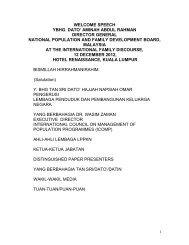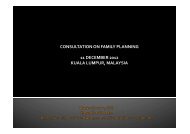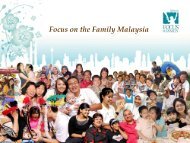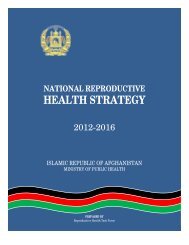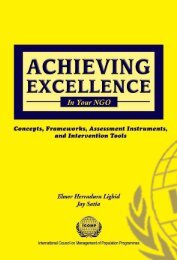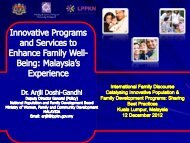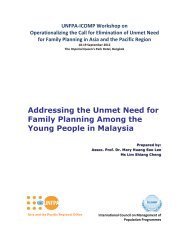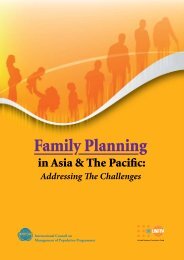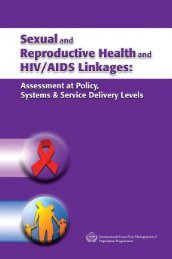Inter-lInkages between PoPulatIon DynamIcs anD DeveloPment In ...
Inter-lInkages between PoPulatIon DynamIcs anD DeveloPment In ...
Inter-lInkages between PoPulatIon DynamIcs anD DeveloPment In ...
You also want an ePaper? Increase the reach of your titles
YUMPU automatically turns print PDFs into web optimized ePapers that Google loves.
• Consolidate and integrate financial assistance and training programmes to enhance participation of womenin business entrepreneurial activities; and• Create enabling environment (for example, financial assistance, childcare facilities, flexible workingarrangements).Single mothers are underscored in the Ninth Plan. To encourage their participation in the labour force and toreduce incidence of poverty:• Education and training programmes are provided for single mothers to facilitate involvement in smallbusiness or income generating activities;• Loan/micro-credit such as Skim Pinjaman Ikhtiar and Skim Khas Ibu Tunggal for them to undertakeincome-generating activities;• Training in ICT such as <strong>In</strong>kubator Kemahiran Ibu Tunggal to provide skills enhancement; and• Program Anak Angkat, which is a smart partnership with the private sector to provide financial support forthe education of children of single mothers.<strong>In</strong> the Ninth Plan, existing laws and regulations that discriminate or inhibit the well-being and participationof women in development efforts are reviewed. Among those reviewed or amended are:• Employment Act 1955, <strong>In</strong>dustrial Relations Act 1957, and Occupation Safety and Health Act 1994 toinclude provisions that prohibit all forms of sexual harassment;• Social Security Act 1969 to allow widows of civil servants to continue receiving pensions after remarriage;• Land Act 1960 to allow wives of land settlers equal ownership of land provided to their husbands underland development schemes;• Employees Provident Fund (EPF) to allow husbands to contribute to accounts under their wives’(homemakers) name through self-employed contribution scheme; and• Immigration rules to allow foreign men married to Malaysia women to renew their social visit pass annuallyinstead of <strong>between</strong> every 1-6 months previously.Other initiatives include encouraging uniformity among states in the judgment of cases pertaining to IslamicFamily Law and the private sectors to review their collective agreements to ensure no gender discrimination.To address VAW, the Ninth Plan is promoting concerted efforts among the public sector, NGOs and the privatesector to implement preventive and rehabilitative programmes such as:• Awareness and training programmes relating to understanding gender roles and expectations, preventingabuse and violence, resolving conflicts and maintaining family harmony;• Training for volunteers on identification of violence and treatment of victims, who will be stationed incommunity service centres, hospitals and shelter homes;• Gender sensitisation courses for agencies involved in handling and managing of domestic violence cases;• Women against Violence (WAVE) campaigns;• Developing standard operating procedures for use by agencies and NGOs in handling domestic violencecases; and• Gazetting more shelter homes.The establishment of the Ministry of Women, Family and Community Development as a full-fledge ministrydemonstrates the Government’s commitment to raise the status of women in this country. The function ofthis ministry is to ensure that various perspectives of gender, their families and needy communities areintegrated into the formulation of national policies from the planning to the implementation stages.The Ministry has played a significant role in bringing about gender equality in Malaysia. This ministry hasworked together with other key ministries and agencies such as MOH, Ministry of Human Resources, Ministryof Entrepreneur and Cooperative Development, Ministry of Education, Ministry of <strong><strong>In</strong>ter</strong>national Trade and<strong>In</strong>dustry, Family Development agencies at state level as well as parliamentary constituency, NGOs and theprivate sector.31



